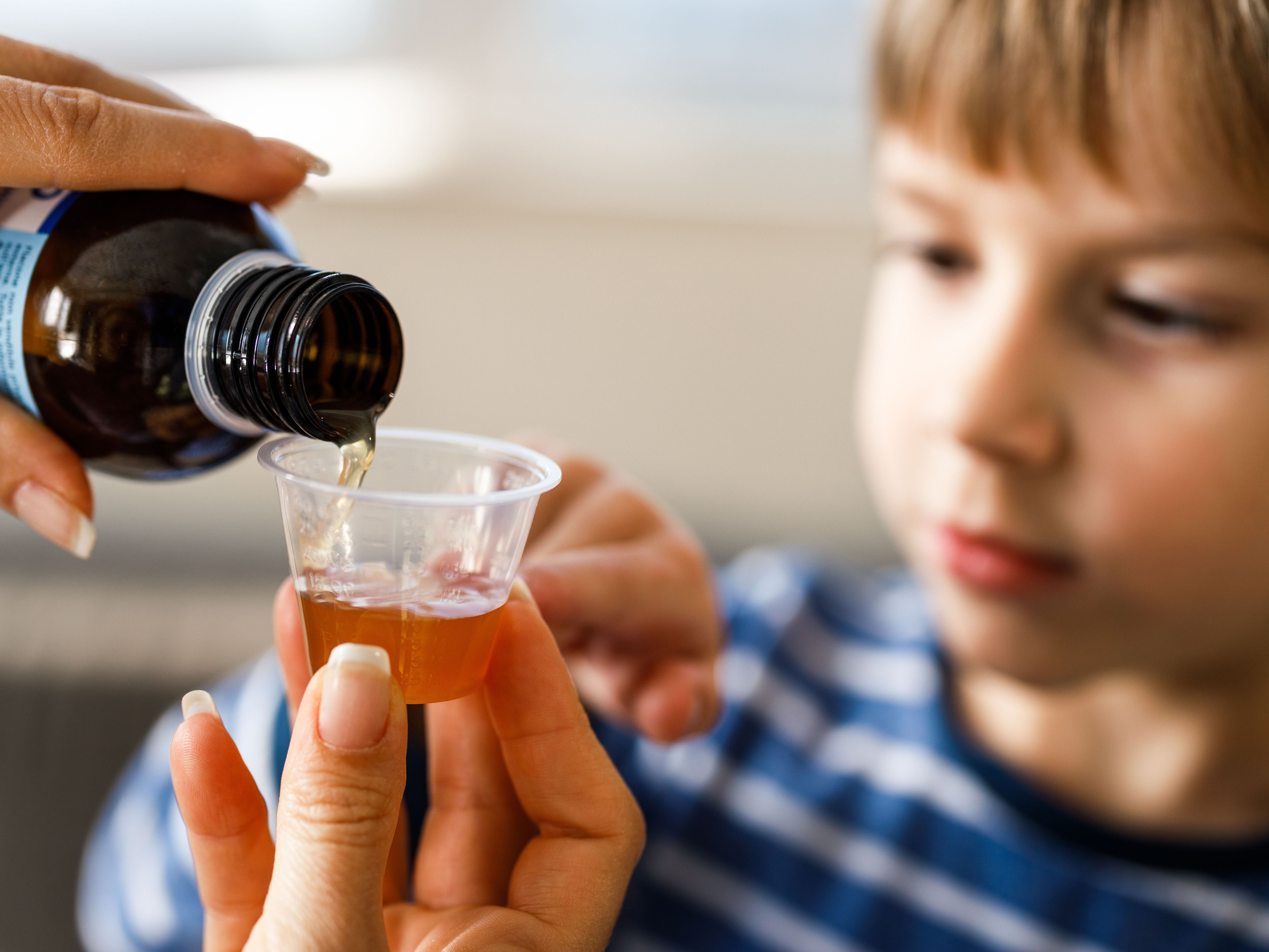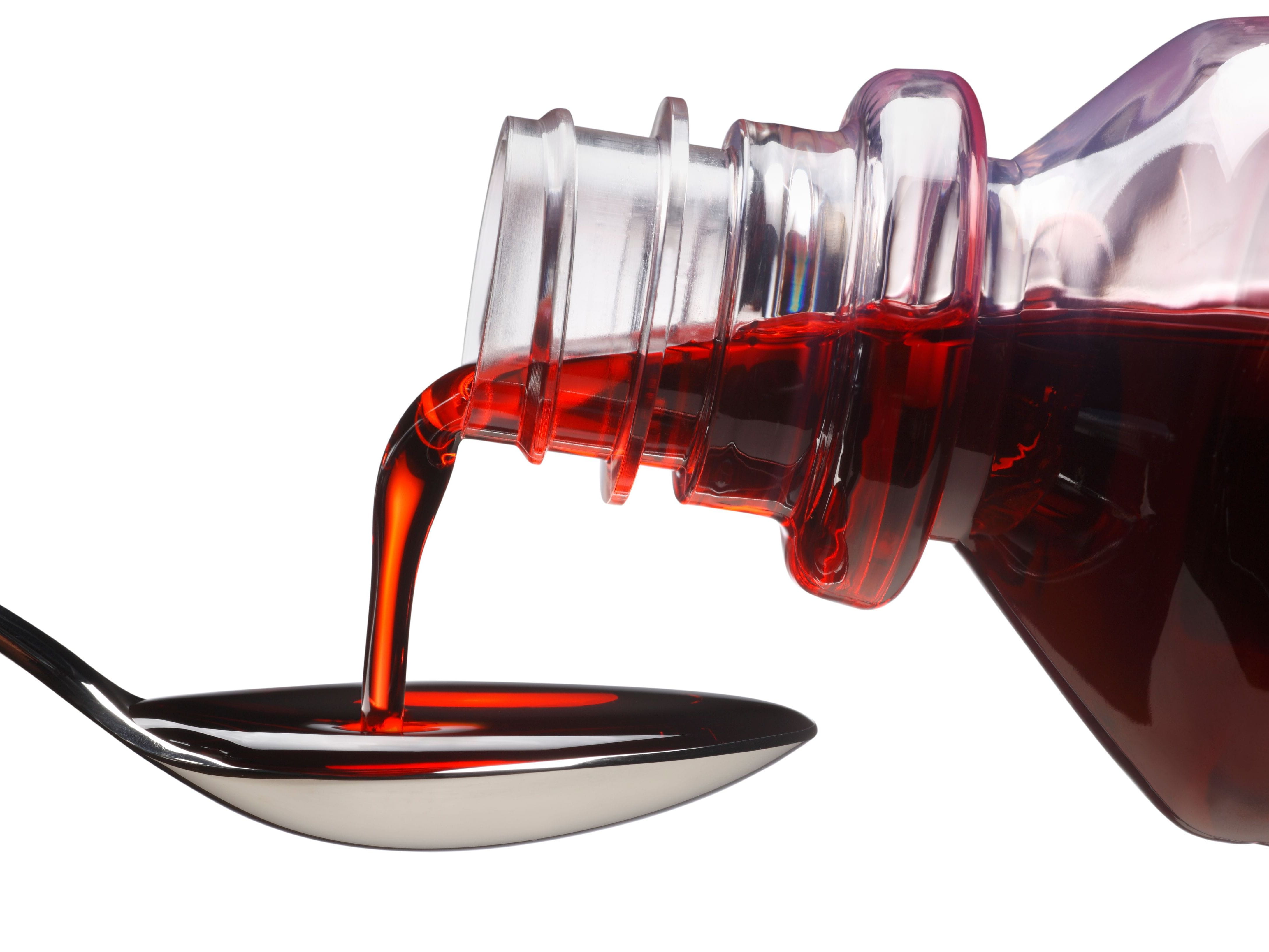Is it Safe to Use Liquid Cough Medicine?

The Bottom Line
Cough syrup is a medicine easily purchased without a prescription in drug stores. Liquid cough medicine usually contains multiple ingredients such as dextromethorphan, guaifenesin, menthol, and honey to alleviate cough and cold symptoms. Using recommended age-specific dosing guidelines is critical for safe use of this medicine.

How does cough medicine work?
Over-the-counter (OTC) liquid cough medicines can contain many different ingredients to help relieve symptoms of cough, including antitussives (cough suppressants), expectorants, antihistamines, decongestants, and pain and/or fever relievers.
Antitussives, such as dextromethorphan, work in the brain to send a signal that suppresses the cough. (Some prescription liquid cough medicines contain codeine, an effective opioid ingredient to suppress cough). Expectorants thin the mucus to help clear the airway, and include guaifenesin, menthol, and honey. Antihistamines dry out the nasal passages, thereby reducing runny nose and cough caused by post nasal drip. Common antihistamines are diphenhydramine and chlorpheniramine. Decongestants such as pseudoephedrine and phenylephrine decrease nasal secretions and swelling to help relieve nasal congestion and ease breathing. Examples of common pain and fever reducers include acetaminophen and ibuprofen.
Can you overdose on liquid cough medicine?
When taken in the recommended and age-specific dose, liquid cough medication is safe. If more than the recommended dose is ingested, side effects and toxicity can occur, including hallucinations, nausea, vomiting, elevated heart rate, irritability, dizziness, and difficulty walking. Even life-threatening problems such as seizures, irregular heartbeat, breathing problems, coma or death, and liver or kidney damage have been attributed to taking too much liquid cough medication.
Other adverse effects of cough medicine
Liquid medication formulations contain several inactive ingredients as part of the formula to deliver the medication. Some products contain sugar which can cause fluctuations in blood sugar in people with diabetes, Some products may contain alcohol, which can be problematic for people who have alcohol use disorder or in children due to the risk of alcohol intoxication. The FDA has strict regulations for the manufacturing of liquid cough medications in the US. However, not all countries have the same regulations, and incidents of contamination in liquid cough medicines manufactured and purchased in other countries have resulted in adverse effects or deaths as in the case of diethylene glycol contamination of cough syrup around the world in 2022-2023.
Can you take cough medicine while pregnant?
Most of the common ingredients in liquid cough medications are considered safe while pregnant. One active ingredient in liquid cough medicine, dextromethorphan, is considered safe in pregnant patients past the first trimester (12 weeks), but is not recommended during the first trimester. If you are pregnant, it is best to stick to using single-ingredient cough medication.
Medicines to avoid mixing with cough medicine
Patients should be mindful of other medications they are taking to avoid accidental “doubling up” of ingredients. Because liquid cough medicines frequently contain multiple types of medications, avoid taking additional OTC or prescription medications that contain similar ingredients such as additional antihistamines, Tylenol or acetaminophen-containing medicine, Advil- or ibuprofen-containing medicine, or medications indicated specifically for sleep. Unintentionally taking medications with the same or similar ingredients is a major cause for adverse symptoms when using cough medicine.
Dextromethorphan and guaifenesin, very common central ingredients in cough medications, can interfere with certain prescription medications, increasing the possibility of side effects or toxicity such as increased blood pressure, seizure, liver or kidney failure, coma, or death. Before using multiple medications to treat symptoms of a cough or cold, call Poison Control.
Is liquid cough medicine safe for children?
Cough and cold medicines should not be given to babies or children under the age of 4 years as they can experience serious and even life-threatening adverse effects. Additionally, the FDA recommends against using decongestants in children younger than 12 years. It is considered safe to use cough medicines in children older than 6 years but recommended dosing guidelines must be strictly followed.
Tips for treating a cough in children
There are several ways to treat cough in children without medication, including using a humidifier, saline nasal spray to clean nasal passages and relieve congestion, or using a bulb syringe to clear nasal passages in infants. A teaspoon of honey can be given to children 1 year and older to alleviate cough. Mentholated rubs may be used on the skin (not orally) in children 2 years and older. It is important to keep unwell children hydrated with water or Pedialyte. Warm drinks may soothe the throat.
My child swallowed liquid cough medicine. What should I do?
If you are concerned about a child who has or is suspected to have ingested cough medicine, seek medical advice from a health professional or Poison Control hotline immediately.
If someone swallows too much liquid cough medicine or if you have a question about using liquid cough medicine safely, help from experts is available through thewebPOISONCONTROL online tool and by phone at 1-800-222-1222. Poison Control’s expert guidance is always free, confidential, and available 24 hours a day.
Kit DeMarco, PharmD
Community Pharmacist
Poison Control Media Information
Did you find this page helpful? If so, we need your support. Poison Control is in constant competition with misinformation online. Links to www.poison.org or our webPOISONCONTROL triage tool from other websites and blogs help internet searchers quickly find accurate information and Poison Control’s contact information in an emergency. If you use the content from this page, please provide attribution via a link back to this page, www.poison.org, or https://triage.webpoisoncontrol.org/#!/exclusions. By doing so, you could save a life. Thank you!
Poisoned?
Call 1-800-222-1222 or
Prevention Tips
- Keep cough medicines out of reach of children.
- Assign administration of medicines to 1 caregiver to avoid accidental doubling up on doses.
- Check with the primary care-giver before administering medication to children 7 years old and younger.
- Avoid taking multiple medications with the same or similar ingredients.
- Do not use OTC cough medication for more than 7 days.
- Drink plenty of water and get adequate rest.
- When using liquid cough medicine, be sure to measure carefully with a specific measuring device (not a kitchen teaspoon).
- If your cough symptoms do not improve or get worse in 7 days, you should consult a doctor. These medications are not for long-term use. Using these medications for longer than a few days can result in serious side effects.
This Really Happened
Case 1. A 5-year-old boy was given Cough DM medicine for a cold. Mom noted he was not acting like his normal self. He was hyperactive and agitated, had very dilated pupils, and his lips were quivering uncontrollably. She took the child to the hospital where he was also noted to have high blood pressure. The child was monitored in the Emergency Department for 8 hours until the symptoms resolved. He was discharged from the ED with no further symptoms.
Case 2. A 15-year-old boy drank half a bottle of Vick’s Nyquil and took 4 tablets of ibuprofen to treat his cold symptoms. He became very drowsy so his grandmother took him to the Emergency Department. His lab work showed he was dehydrated. He was treated in the hospital and discharged within 24 hours of taking the medication.
Case 3. A 59-year-old woman took her Delsym doses too close together by mistake. She lost track of how many doses she took and started to feel unwell. She had dizziness, blurred vision, and felt mentally cloudy. She went to the Emergency Department. Her ECG in the ED showed an abnormal heart rhythm. She was treated in the ED and discharged home after her symptoms resolved.
For More Information
References
Over-the-Counter Cough Medicines: A Complete Guide. Medically Reviewed by Jabeen Begum, MD on June 06, 2024 Written by WebMD Editorial Contributor, Allison Torres Burtka. WebMD. https://www.webmd.com/cold-and-flu/otc-meds Accessed 10/21/24.
Diantini A, Alfaqeeh M, Permatasari LI, Nurfitriani M, Durotulailah L, Wulandari W, Sitorus TDR, Wilar G, Levita J. Clinical Toxicology of OTC Cough and Cold Pediatric Medications: A Narrative Review. Pediatric Health Med Ther. 2024 Jul 11;15:243-255. doi: 10.2147/PHMT.S468314. PMID: 39011322; PMCID: PMC11249067.
Should you give your kids medicine for coughs and colds? FDA.gov/consumers. https://www.fda.gov/consumers/consumer-updates/should-you-give-kids-medicine-coughs-and-colds Accessed 10/21/24.
Cough syrup oral liquid - uses, side effects, and more. WebMD.org. https://www.webmd.com/drugs/2/drug-54352-1391/cough-syrup-oral/non-opioid-antitussive-antihistamine-oral/details Accessed 10/21/24.
Cough and cold combinations (oral route). MayoClinic.org. January 31, 2024. https://www.mayoclinic.org/drugs-supplements/cough-and-cold-combinations-oral-route/description/drg-20061164 Accessed 10/21/24.
Over-the-Counter Cough Medicines: A Complete Guide. WebMD.com. June 6,2024. https://www.webmd.com/cold-and-flu/otc-meds Accessed 10/21/24.
Poisoned?
Call 1-800-222-1222 or
Prevention Tips
- Keep cough medicines out of reach of children.
- Assign administration of medicines to 1 caregiver to avoid accidental doubling up on doses.
- Check with the primary care-giver before administering medication to children 7 years old and younger.
- Avoid taking multiple medications with the same or similar ingredients.
- Do not use OTC cough medication for more than 7 days.
- Drink plenty of water and get adequate rest.
- When using liquid cough medicine, be sure to measure carefully with a specific measuring device (not a kitchen teaspoon).
- If your cough symptoms do not improve or get worse in 7 days, you should consult a doctor. These medications are not for long-term use. Using these medications for longer than a few days can result in serious side effects.
This Really Happened
Case 1. A 5-year-old boy was given Cough DM medicine for a cold. Mom noted he was not acting like his normal self. He was hyperactive and agitated, had very dilated pupils, and his lips were quivering uncontrollably. She took the child to the hospital where he was also noted to have high blood pressure. The child was monitored in the Emergency Department for 8 hours until the symptoms resolved. He was discharged from the ED with no further symptoms.
Case 2. A 15-year-old boy drank half a bottle of Vick’s Nyquil and took 4 tablets of ibuprofen to treat his cold symptoms. He became very drowsy so his grandmother took him to the Emergency Department. His lab work showed he was dehydrated. He was treated in the hospital and discharged within 24 hours of taking the medication.
Case 3. A 59-year-old woman took her Delsym doses too close together by mistake. She lost track of how many doses she took and started to feel unwell. She had dizziness, blurred vision, and felt mentally cloudy. She went to the Emergency Department. Her ECG in the ED showed an abnormal heart rhythm. She was treated in the ED and discharged home after her symptoms resolved.
